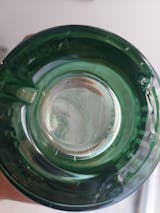How to sprout seeds in a mason jar?
Pop open your mason jars and get your favorite seeds out – it’s time to learn how to sprout seeds at home! Learn where sprouting originates from, some good seeds to sprout for beginners, how sprouts can be introduced to your diet, and how you can make your own in a few simple steps.
What is sprouting
Sprouting is the natural process that takes place when seeds germinate and release shoots. In the area of nutrition, sprouting also refers to the practice of germinating seeds such as mung beans, alfalfa or broccoli seeds to be eaten raw or cooked, which can ultimately give them more nutritious density.
The process of sprouting is simply the process where seeds are germinated and later consumed raw. When seeds are soaked in water over a longer period of time, they slowly produce young shoots as their outer shells break open, giving healthy and nutritious benefits when eaten.
How can sprouting be served?
Offering crunchy textures and mildly spicy and peppery notes in some cases, sprouts are a great addition to give dishes textures and flavour. Sprouts can garnish a salad or open sandwich, be combined in a stir fry,
The benefits of sprouting
When it comes to the humble sprout there’s more to this simple garnish than adding texture and a zing of flavour to your everyday meals. Sprouts come with a host of endless benefits! These include:
- Boosting blood circulation
- Helping digestion
- Building the immune system
- Lowering acidity
- Encouraging healthy hair
- Improving eyesight
Sprouting your own seeds t home is also more economical than buying, easy to implement and better for the environment than buying them in the supermarket where they often are packaged in single-use plastics. Sprouting seeds takes next to no space either, if you can fit a mason jar on your counter top, you can sprout!
The story of sprouting seeds
Nutritionally and medicinally, sprouts can be traced very far back in history. It has been said that Ancient Chinese physicians considered sprouts as helpful cures for many disorders and ailments as far back as 5,000 years ago.
Sprouts have since remained a core staple in contemporary Asian diets, but it took centuries for the rest of the world to fully realize their full spectrum of nutritional benefits.
What do you need to sprout seeds in a mason jar?
- Clean glass mason jar
- Cheesecloth or wire mesh
- Our Pearl Luna Mesh jar has been specifically designed with sprouting in mind. A tailor-made sprouting jar with a fully detachable Mesh disk allows for a comfortable and hygienic sprouting experience
- Sprouting seeds of your choice
- Rubber bands
- Food storage bag

What seeds can you sprout?
Funnily enough, it is possible to sprout just about any edible grain, bean and legume, even chia and chickpeas can be sprouted! However, kidney beans should be avoided as they contain toxins that can make you feel sick when consumed raw. Here are some of our favorite sprouts to experiment with for beginners.
- Alfalfa sprouts are one of the most popular varieties of sprouts as their mild the taste means they pair well with just about everything! Packed with vitamins and minerals and are low in calories, and versatile, these sprouts are an excellent addition to a healthy or plant-based diet.
- Mung bean yields juicy sprouts that feature white stems and a mild taste. Their crunchy texture helps them to absorb the flavor of whatever seasoning or sauce they are combined with. You can often spot them in tasty stir-frys.
- Broccoli sprouts produce thicker, robust sprouts with a nutty, peppery flavor similar to radish. Strangely, they don’t taste like broccoli. This sprout is great for adding flavor and body to dishes and salad and is high in antioxidants.
- Radish sprouts these slender sprouts boast red-tipped leaves and look beautiful as a garnish. They taste similar to mature radishes but are less peppery or spicy.
The Method
Step 1
Choose your mason jar and lid. We use our Luna Mesh Jar which was designed to make sprouting seeds easier thanks to its convenient measuring units to drain vegetables straight from the jar.
Step 2
Thoroughly wash and rinse your glass mason jar and place it to one side. Take your seeds and gently wash them removing and misshapen seeds or dirt particles, rinsing well.
Step 3
Place 1 or 2 tablespoons of seeds into your glass mason jar. Cover them with about 2 inches of lukewarm water and allow them to soak.
Step 4
Cut a piece of cheesecloth or muslin fabric so that it covers the top of your jar and leaves a small piece of material hanging on the side. You can either secure it with a rubber band or with the lid band of your glass mason jar. If you are using our Luna Mesh jar, the mesh lid will already be sufficient. This step allows for the air to flow and is essential for the sprouting process.
Allow to sit for eight hours or overnight until the seeds have doubled in size.
Step 5
The next day, drain the water from the jar through the mesh and rinse the seeds by adding fresh water to the jar, swishing the seeds around gently. Mesh lids are effective for this step as they can be inverted at an angle easily to drain for long periods.

Step 6
Rinse seeds with cool water and repeat draining. Rinse gently to avoid damaging tender new sprouts. Usually, 2-3 days of rinsing and draining about 3 times per day is sufficient.
Step 7
When your sprouts are ready to be harvested, rinse them one final time and remove un-sprouted seeds, and seed the hulls, if desired. Drain thoroughly one final time before eating or storing sprout
- Store your sprouts in a food storage bag with a paper towel to soak up any excess moisture.
- Want to make a larger batch of sprouts? It’s usually best to do some in several jars, rather than trying to fit all of the seeds in one jar as the seeds will need some air to circulate through the jar.
- Different seeds, nuts and legumes require various hours to soak and sprout, for more information and the varying time you can check out this helpful soaking and sprouting chart here.
Buy jars for sprouting seeds
Our Sprouting Starter Kit is ideal for those interested in sprouting seeds at home.
The mesh disk and all components are easily detachable by pressing them slightly out of the steel ring. Both the Mesh disk and the steel ring are made of stainless steel preventing the onset of rust. You can use the Luna Mesh for sprouting your favorite seeds or straining foods straight from the Mason Jar.












